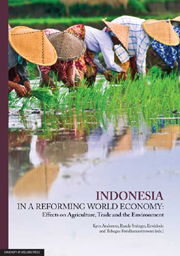Book contents
- Frontmatter
- Contents
- List of tables, figures and boxes
- FIGURES
- Acronyms
- Preface
- List of contributors
- 1 Introduction
- 2 Effects of growth, its interruption, and the Uruguay Round on Indonesian agriculture
- 3 Effects of AFTA and APEC trade policy reforms on Indonesian agriculture
- 4 Trade liberalisation and soil degradation in Indonesia
- 5 Will the Uruguay Round and APEC reforms harm air and water quality in Indonesia?
- 6 Impacts of agricultural protection growth at home and the WTO's Doha Round on Indonesian agriculture
- 7 Effects of agricultural policy reform on household and regional income distribution in Indonesia
- 8 Effects of farm policy reform on Indonesia's secondary food crops
- 9 Effects of agricultural policy reform in Indonesia on its food security and environment
- 10 Impacts of trade policy reform on income distribution and poverty in Indonesia
- APPENDIX 1 The WAYANG Model of the Indonesian economy
- APPENDIX 2 The GTAP Model and database
3 - Effects of AFTA and APEC trade policy reforms on Indonesian agriculture
Published online by Cambridge University Press: 05 June 2012
- Frontmatter
- Contents
- List of tables, figures and boxes
- FIGURES
- Acronyms
- Preface
- List of contributors
- 1 Introduction
- 2 Effects of growth, its interruption, and the Uruguay Round on Indonesian agriculture
- 3 Effects of AFTA and APEC trade policy reforms on Indonesian agriculture
- 4 Trade liberalisation and soil degradation in Indonesia
- 5 Will the Uruguay Round and APEC reforms harm air and water quality in Indonesia?
- 6 Impacts of agricultural protection growth at home and the WTO's Doha Round on Indonesian agriculture
- 7 Effects of agricultural policy reform on household and regional income distribution in Indonesia
- 8 Effects of farm policy reform on Indonesia's secondary food crops
- 9 Effects of agricultural policy reform in Indonesia on its food security and environment
- 10 Impacts of trade policy reform on income distribution and poverty in Indonesia
- APPENDIX 1 The WAYANG Model of the Indonesian economy
- APPENDIX 2 The GTAP Model and database
Summary
Indonesia is facing commitments to international trade liberalisation through the Uruguay Round, its participation in Asia Pacific Economic Cooperation (APEC), and its collaborative effort with other ASEAN economies to form an ASEAN Free Trade Area (AFTA). As part of the Uruguay Round commitment, Indonesia has been reducing its border tariffs, opening its markets, as well as reducing other domestic distortions especially in the agricultural sector.
As a member of APEC, Indonesia is determined to liberalise trade and investment in the Asia Pacific region. In the meeting in Bogor, Indonesia, in 1994, APEC economies set the long-term goal of free and open trade and investment in the Asia Pacific. The Bogor Declaration hopes to realize the goal in 2010 for developed economies and 2020 for developing economies. Furthermore, the Bogor meeting clarified the three pillars on which APEC would be based, namely, Trade and Investment Liberalisation and Facilitation (TILF); Economic and Technical Cooperation (ECOTECH); and Development Cooperation. Import tariffs have been cut unilaterally in APEC member economies, and further tariff cuts are expected so as to implement the Bogor goal.
While considerable industrial tariff reduction has been implemented in APEC, there has not been much discussion of agricultural liberalisation. This is different from the Uruguay Round which explicitly specifies reductions of import tariffs, domestic subsidies, and export subsidies on agricultural commodities. In APEC, the tariff reduction measure is generally based on the average level of tariff.
- Type
- Chapter
- Information
- Indonesia in a Reforming World EconomyEffects on Agriculture, Trade and the Environment, pp. 28 - 39Publisher: The University of Adelaide PressPrint publication year: 2009



